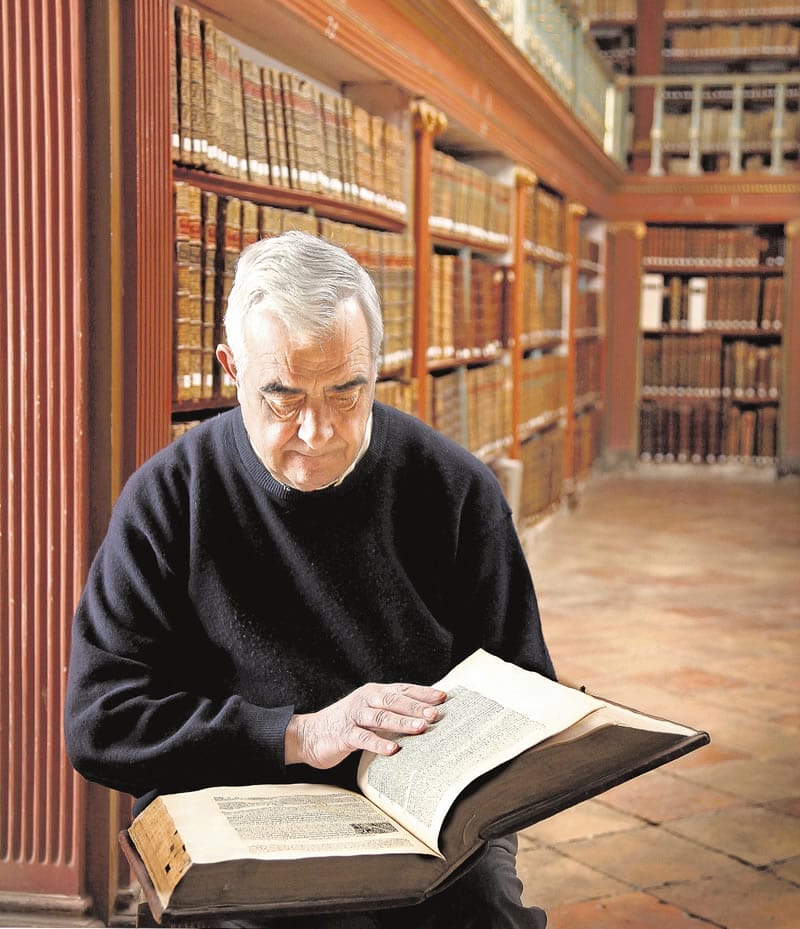A Riojan by birth and priest all his life (“God directed me to priesthood when I was only 12”), Fr. Olarte turned 70 last September, the last 19 of his years as archivist of this impressive monastery, declared Patrimony of Humanity in 1997. “People ask me often ‘Why did you become a friar’ and I would reply ‘So as not to contradict God’”, the monk responds from his office in San Millán.
The so-called Riojan Escorial is inhabited by a community of 12 Augustinian Recollects, who continue a monastic life initiated in the 5th century by the hermit, Millán. But it is not the contemplative and penitent life that the good-natured Fr. Olarte enjoys most; dedicated to medieval studies and having had his share of this valley of tears, he does not hide his fondness for the small pleasures that his voluntary retreat offers: a good wine at meals (“there are friars who drink only water, well, that’s their lookout”), an idyllic landscape to get his body moving with long afternoon walks and a mountain of old books at his disposal, his real weakness.
It is clear enough that Fr. Olarte does not live like a hermit, although he spends long hours in the library with his codices, the monastery’s ground zero. He loves books, the medieval ones above all. Perhaps he sees in them the reflection of his companions who aeons ago and in that same library he loves, dedicated their lives to adorn the edges of each page, to craft the letters in ink, and to illustrate them with drawings and perfect miniatures. Through those manuscripts, Fr. Olarte has come to know (and understand) deeply the monastic life of the Middle Ages. It was of extreme harshness, great austerity and sobriety, of spiritual perfection, of bodily punishments. Not too much for him. Life in Yuso now is easier; there are days of abstinence and fasts but not too many, and the frugality at lunch is not extraordinary. “There are things I am prohibited, and they are few, and others that I prohibit myself from”, he admits. Fr. Olarte rises at 6:45 a.m. and goes to bed at 11 p.m. Between two and a half hours of prayers, eight hours of study, the three meals and a walk in the nearby beech woods, he has not much time for anything else. There is no heating system in the library, the principal “hassle” for being a Patrimony of Humanity. There are others, like when Fr. Olarte picks out a book for restoration, a commission of technicians and politicians have to give the go ahead. Paperwork, red tape, reports… it’s a mess. “Moreover”, adds the priest, “I have to bear with many pretentious visitors. There are learned ones and others not so. One day an aristocratic-looking lady asked me about the Lateran couplets, and I replied that we had the San Millan Annotations. She said that was impossible, she called me an ignoramus and threatened with reporting me to the Academy of the Language. I told her to go ahead and give my regards to my good friend Victor (García de la Concha), the director. One has to bear with hoity-toity persons”. The other kind of visitors, those who stay for some days in San Millan to retreat and to live the peace and serenity radiated by the monastery stones, Fr. Olarte understands them well. They come, they join the community of friars, they shed off their tiredness, the hurry and the stress, and they leave happy. “A week does not change persons, but at least they leave grateful”, he comments on the growing fad of “luxury-free cloisters”.
Happy for having disseminated another image of La Rioja apart from the wine, Fr. Olarte is the faithful custodian of 11,000 pre-19th century books, among them 20 incunabilia (before 1500) and 150 sole extant copies. That heritage is like a summary of the literary preferences of each of the monks who have resided in San Millán since 1,500 years ago. There are rare tomes, treatises on geometry, botany, astroly and philosophy and a curious French translation of “Gulliver’s Travels”, published in 1727. “It is so valuable that there is an identical one in the Library of Paris, and there they don’t even allow it to be seen!”. .
Offers there have been, and very generous ones too, but the bible, like the soul of Fr. Olarte, is not for sale.


